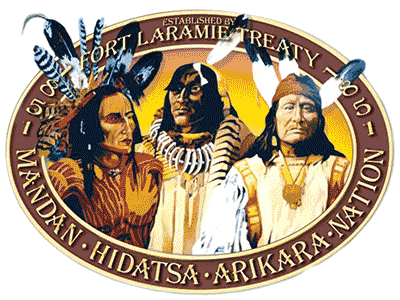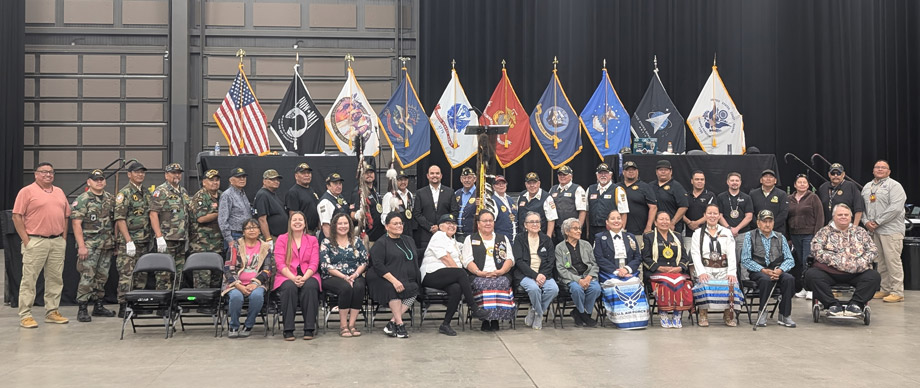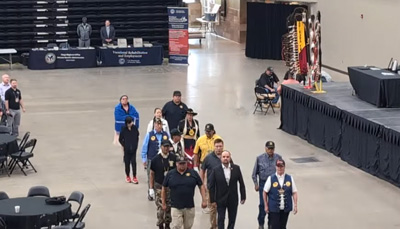Fall 2025 Native Aging Visions Newsletter
Subscribe
Native Aging Visions newsletter features stories, tips, and other matters that are important to Native communities.

Title VI Spotlight: From a 30-day Appointment to a Career
 In western North Dakota, lies the Mandan, Hidatsa and Arikara
Nation, a tribe comprised of three Indian Nations. In the heart of their lands runs the Missouri
River. It was here, where the Title VI Director Polly Chase talked about how her Title VI program keeps
evolving to meet the needs of the Elders.
In western North Dakota, lies the Mandan, Hidatsa and Arikara
Nation, a tribe comprised of three Indian Nations. In the heart of their lands runs the Missouri
River. It was here, where the Title VI Director Polly Chase talked about how her Title VI program keeps
evolving to meet the needs of the Elders.
For nearly two decades, Polly has dedicated her career to supporting Elders and caregivers through Title VI on the Fort Berthold Reservation. What started as a short-term, 30-day appointment in the director position, has grown into a 19-year commitment to building programs, expanding services, and improving the lives of the Elder community.
"When I started, the program was small – just four employees including me," Polly recalled. "Now we have 13, and we serve all the communities on Fort Berthold. The program has grown in ways I didn't expect, and every day is busy but rewarding."
Day-to-day, Polly oversees multiple programs, including Title III and Title VI initiatives, managing reporting requirements for federal, state, and tribal entities. Her staff assist Elders with Social Security, Medicare, Medicaid, transportation, equipment, caregiver support, and access to a variety of community services. Outreach events such as health fairs, sobriety awareness programs, and career fairs also fall under her watch, ensuring Elders and the wider community stay informed and engaged.
The reservation is divided into five communities, each with its own unique challenges and expectations. This means Polly and her team must continually adapt their services to meet local needs. "Some communities we look forward to visiting because we know it's going to be fun and people will show up," she said. "It's rewarding to see the differences and similarities across the communities."
Over the years Polly's passion for her work has continued to grow and she emphasizes that people in this line of work must genuinely care for Elders. "You have to like this job," she said. "You have to like Elders and people. If you don't, this isn't the right place for you."
Despite long days that often extend past 6 pm, she finds satisfaction not only in providing services and interacting with people, but also in seeing the programs grow. For instance, when asked if there is a story that stands out, she mentions:
One Elder, originally from the southern part of the reservation, moved to New Town with her family. While there she came in to eat often. Before leaving to return home for the winter, she wrote a note expressing her appreciation and mentioned she was going down south where it was warmer. The first thought was she must be going to Arizona for the winter, but that was not the case. Instead, she was moving back to the southern part of the reservation. The mix-up provided a memory that still produces smiles and laughs.
Keeping Elders Engaged: Bingo on the Hill
In the spring of the year, during Older Americans Month, the Johnny Bird Community Center fills with the hum of voices. Past the casino, up the hill in Dragswolf Village, the gymnasium opens its doors to a tradition that has quietly grown into one of the community's most cherished gatherings: Elder Bingo.
The event has grown into a yearly tradition over the past four to five years and is always well attended. It provides Elders with an opportunity to gather, socialize, and enjoy the chance to win prizes. Between games, Elders can visit resource tables, where they can learn about programs and services available to them.
Prizes, funded through donations from community members and the Tribal Business Council, ranged from practical items to unique gifts tailored to the interests of participants. This year, a special recognition honored the Elders who were present, aged 80 and over. The Four Bears Councilman Robert White presented $150 gift cards to each attendee in that age group, highlighting their decades-long contribution to the community.
Elders Fair Highlights Tribal Programs, Community Engagement
Earlier this year Polly and her team organized the annual Elders Fair, which started in May 2017 with a break occurring during the Covid Pandemic. Typically, the conference attracts 60 to 70 participants, offering a series of sessions that highlight tribal programs and resources for the elderly community.
This year's fair featured presentations from various programs, including the National Resource Center on Native American Aging, to discuss results from their needs assessment. The Emergency Operations Center, which introduced its service dog, presented their work to the audience. Local area land management representatives also spoke to the group about tribal lands.
With positive feedback, engaging presenters, and topics that matter to Elders, Polly and her staff want the fair to keep growing. Their goal is to provide Elders with meaningful opportunities to connect with community resources, learn new information, and engage directly with tribal programs. These events bring people together to share stories, learn from one another, and explore available resources. For Polly and her team, the heart of the work is ensuring Elders in their community feel valued, supported, and connected.
Stand Down Event Helps Native Veterans
In the middle of June, Mandan, Hidatsa and Arikara Nation and the 4 Bears Casino and Lodge, in New Town, North Dakota, hosted the 3rd Annual Stand Down Event for veterans. Veterans, spouses, and caregivers from all backgrounds were invited to come together once again to network, listen, and learn about resources available to them, and be recognized for their sacrifices and service.

The event opened with the posting of the colors from the local American Legion and with two drum groups, Clarks Creek Singers and Thunder Butte Singers, taking turns performing. As the posting of the colors continued, local veterans, dressed in their regalia, followed behind until the flags were on display. Throughout the posting of the colors, Lawrence Baker, master of ceremonies, provided cultural insight into what was going on so the audience could fully appreciate what they were witnessing.
Resources and Assistance
Presentations came from the Veterans Health Administration about eligibility, enrollment, and travel, and from the Veterans Benefits Administration addressing compensation and pension. Additional topics from a wide range of groups covered caregiver support programs for elderly veterans, care in the community for veterans, mental health, suicide prevention or veterans' crisis line, Native American direct loan programs, telehealth, and opportunities for educational support if veterans wanted to pursue additional education.
During breaks, veterans were able to go from booth-to-booth to ask more personal questions about topics they heard from presentations or to learn about something new. Throughout the two-day conference, attendees were able to participate in drawings for items donated by vendors and the Three Affiliated Tribes.
Honoring Veterans' Sacrifices
Later on, audience members were able to listen to remarks from a Gold Star Mother – a mother whose son or daughter died while serving in the U.S. Armed Forces. It was a powerful moment as she described what her son's loss meant to her and their family; life was never the same afterwards. Her comments and description of events that followed after her son made the ultimate sacrifice brought everything full circle as the risks veterans take to serve their country was told from a grieving mother's point of view.
 After a full day of presentations and discussions, attendees were invited to eat, interact, and listen to
the keynote speaker, Dean Dauphinais, at dinner. As told by the keynote speaker: Dauphinais reminded
attendees that Native veterans are often "the first to serve, yet the last to be served." He called on
tribal nations, communities, and families to rally around their veterans instead of waiting for federal
systems alone to meet their needs. Dauphinais emphasized that culture itself is prevention, and these
Native-led Stand Downs create safe, familiar spaces where veterans feel comfortable connecting with
resources. The impact is already clear – Native veterans are filing disability claims, securing
housing loans, and accessing benefits that directly improve their lives because of events like this.
After a full day of presentations and discussions, attendees were invited to eat, interact, and listen to
the keynote speaker, Dean Dauphinais, at dinner. As told by the keynote speaker: Dauphinais reminded
attendees that Native veterans are often "the first to serve, yet the last to be served." He called on
tribal nations, communities, and families to rally around their veterans instead of waiting for federal
systems alone to meet their needs. Dauphinais emphasized that culture itself is prevention, and these
Native-led Stand Downs create safe, familiar spaces where veterans feel comfortable connecting with
resources. The impact is already clear – Native veterans are filing disability claims, securing
housing loans, and accessing benefits that directly improve their lives because of events like this.
Your Data, Your Decisions: The Value of the Identifying Our Needs Survey
By Michelle Meyer, BS
More Than Numbers
For over two decades, the National Resource Center on Native American Aging (NRCNAA) has been committed to helping tribes fulfill the needs assessment requirement for the Office of American Indian, Alaska Native, and Native Hawaiian (Title VI) programs by administering the Identifying Our Needs (ION) survey.
 The ION survey is more than a collection of data points. It provides tribes with their own data to see the
challenges Elders face – such as health concerns, daily living needs, and access to services. By
showing where gaps exist, the survey becomes a guide for Title VI programs and tribal leaders to strengthen
and expand services and to advocate for needed resources.
The ION survey is more than a collection of data points. It provides tribes with their own data to see the
challenges Elders face – such as health concerns, daily living needs, and access to services. By
showing where gaps exist, the survey becomes a guide for Title VI programs and tribal leaders to strengthen
and expand services and to advocate for needed resources.
The ION survey is not for the Administration of Community Living or NRCNAA – it's for your tribe. The results belong to you, empowering your program to make decisions that truly reflect your Elders' priorities.
Support from NRCNAA
NRCNAA remains committed to helping tribes succeed with the survey process.
Our team supports Title VI programs by:
- Providing a comprehensive survey tool.
- Guiding programs through tribal approval processes.
- Providing survey results in clear, actionable formats for tribal use.
Important Dates for Title VI Programs
The Title VI cycle is now open and the application is available for your tribe to complete.
- Title VI Application Deadline: Friday, November 14, 2025
- Survey Submission Deadline: If your tribe is participating in the ION survey, please return completed surveys to NRCNAA by Friday, October 31, 2025 to ensure your results are processed in time for the Title VI application.
NRCNAA will still accept surveys after October 31, but we cannot guarantee results will be ready by the November 14 deadline – though we will do our best to process them as quickly as possible.
Shaping the Future of Elder Care
The ION survey is tribal data, for tribal decision-making. It continues to guide programs and policies that put Elders first, ensuring they have the resources needed to live with dignity and independence while honoring their many contributions to community and culture.